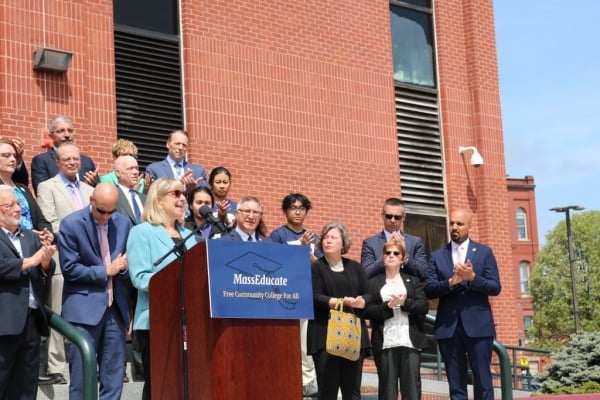You have /5 articles left.
Sign up for a free account or log in.

A free community college proposal included in the Massachusetts Senate’s budget aims to increase the number of students attending community college in the state by 4,000 annually.
Photo illustration by Justin Morrison/Inside Higher Ed | londoneye/iStock/Getty Images
MassReconnect, Massachusetts’s free community college program for nondegree holders over 25, has proven so successful that now some state legislators are looking to extend the offer to all Massachusetts residents who don’t hold a degree—regardless of age or income.
Known as MassEducate, the universal free community college program is a cornerstone of the Senate’s budget, which the chamber approved last week; a committee composed of both House and Senate members now needs to develop a final budget. The plan proposes using revenue from the state’s recently implemented “millionaires tax”—a four-percent tax on earnings over $1 million—to cover the cost of tuition and fees.
Democrat Karen Spilka, the president of the Massachusetts State Senate, is spearheading the effort. In an interview with Inside Higher Ed, she said she believes MassEducate will encourage students who didn’t previously see college as a pathway to enroll. The program might even help reverse the trend of Massachusetts’s young people leaving the state, she added.
“MassEducate will provide opportunity to so many students who will have a better shot at achieving good, family-supporting jobs, and perhaps fulfill their goals … of moving on to a four-year college and staying in our state and getting on the path of the American Dream that every Massachusetts resident deserves,” she said.
Free college has become an increasingly popular policy position in recent years, and MassEducate, if passed, would offer the broadest eligibility for tuition-free community college of any state in the U.S. The program would almost certainly boost community college enrollment; MassReconnect, which passed last year and was implemented for the 2023–2024 academic year, spurred about 5,000 new learners to enroll in community college in fall 2023—the first increase in over a decade. (This paragraph has been updated to clarify MassEducate's eligibility.)

Massachusetts Senate president Karen Spilka announces the MassEducate proposal at Middlesex Community College.
Courtesy of the Office of the Senate President
According to research conducted by the Massachusetts Association of Community Colleges and Boston Consulting Group, free community college for all is projected to increase yearly enrollment by 4,000 students, and yearly degree completion by 2,000. The association estimates that students who enroll in community college through MassEducate would earn $160 million more in total annual wages than if they didn’t attend community college.
The proposal also includes a $1,200 stipend for students whose income is less than 125 percent of the state median to cover books and other expenses, as well as a $10 million fund to support colleges and universities in helping low-income students access their basic needs.
Opportunities and Concerns
A key element of MassReconnect’s success, which political leaders and education access advocates hope will also be the case with MassEducate, is its straightforwardness.
“When you make community college free by simply saying, ‘If you don’t have a degree and you’re over 25, you can come for free,’ that message translates, and it translates exactly to the population we’re trying to reach,” including first-generation students and those who don’t speak English as a first language, said Nate Mackinnon, executive director of the Massachusetts Association of Community Colleges.
That contrasts sharply with programs in other states that may offer free community college to certain populations, but often lose students due to complex paperwork or a failure to clearly communicate whether or not they qualify.
One of the few concerns Mackinnon has about the proposal is the ability of community colleges to keep up with the massive influx of students that MassEducate could bring in. He said institutions faced challenges this past year due to increased enrollment from MassReconnect, with financial aid offices and student success centers struggling to keep up with demand for their support services. He had hoped the Senate would increase funding to an existing program called Supporting Urgent Community College Equity through Student Services (SUCCESS), which funds wraparound services for community college students, but legislators ultimately kept the funding level the same as the previous year, at $18.3 million.
“We’ll make do with what we have,” he said. “In the long run, we’re concerned about our capacity and whether we can grow quickly enough with our staffing to meet the demand from students now that community college will be free.”
Other education access advocates have criticized the plan for taking a one-size-fits-all approach, rather than prioritizing resources and support for lower-income students. Because the program provides “last-dollar” funding after scholarships and other aid are applied, it essentially offers more value to wealthier students, who would pay more tuition out of pocket than lower-income students already eligible for financial aid, said Bahar Akman Imboden, managing director for the Hildreth Institute, a research firm in Massachusetts focused on higher education policy.
Research by the Hildreth Institute estimates that MassEducate would allot students with incomes of $131,000 and above the value of an entire $6,600 tuition payment, whereas students making under $95,000, whose tuition would generally be covered by financial aid, would be allotted only the value of the $1,200 the stipend.
Imboden, who noted her strong support of the free college proposal, said she’s worried that MassEducate will “direct a disproportionate share of these resources to upper-middle-income families” rather than help “working-class low-income background students who face several financial challenges that are beyond just tuition and fees and books. We know that the lowest income students that are Pell-eligible are the ones that often have to stop out because they are unable to cover their cost of living.”
Mackinnon pushed back against that criticism, arguing that few upper-middle-class families send their children to community college in the first place. And even if they do, it's no different from wealthy families whose kids attend public, rather than private, K-12 school.
The future of free community college remains unclear; negotiations over the budget between the House and the Senate have not yet begun, Spilka said, so she is unsure whether the House and Governor Maura Healey will be open to the plan, which was not included in either of their budget proposals.
In response to a request for comment from Inside Higher Ed, a spokesperson for Governor Healey said via email, “The Healey-Driscoll administration is committed to making community college more affordable and accessible. We were proud to partner with the Legislature to pass MassReconnect last year, which makes community college free for Massachusetts residents age 25 and older. The Governor will review the final budget that reaches her desk.”




